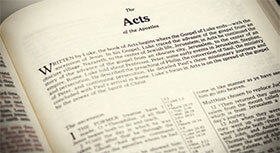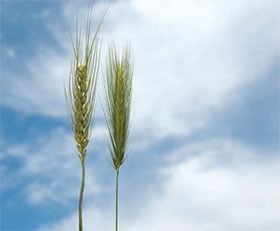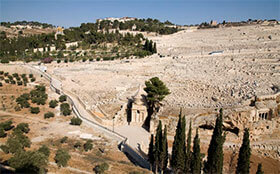A story is told of a time long ago when a wise old Native American chieftain wanted to name a successor to rule his tribe. The two candidates for the position were very different men. One was tall, athletic, outgoing and very popular—and a good politician among the people. The other was shorter, quieter—maybe a bit overweight—and although not as outgoing, he was very respected by the people.
The chief called them together and told them about a high, faraway mountain—one moon’s journey away. Travelling there would be a long, arduous and dangerous undertaking, and successful completion of it would require all their survival skills. Their task was to make their way to the mountain while living off the land, to climb the mountain and find, on the bald, granite top, the lone pine tree located there. Each man was to climb the tree and return with a pine branch from it. The chief wanted to see who would be the first to return, after which he would decide whom he would designate as his successor.
 A few weeks later, the popular candidate was first to return with his pine branch—none the worse for the journey. Days went by, then weeks passed. Finally, the other man returned. He was tired, thinner… and had no pine branch.
A few weeks later, the popular candidate was first to return with his pine branch—none the worse for the journey. Days went by, then weeks passed. Finally, the other man returned. He was tired, thinner… and had no pine branch.
In the presence of the whole tribe, the chief asked why he had not brought back what he had been told to obtain. He replied, “There was no tree on the top of that mountain.” He was made chief immediately!
The old chief knew that the other man had not been to the mountain at all, because it was necessary to make the entire trip to find out that there was no tree on its top.
Character counts! The old chief devised a way of testing the character of the two candidates to separate the one with true character from the one who tried to conceal a lack of it. And he did so for all to see!
God Separates Us in This Age
Separation is a major theme for all of God’s Holy Days, and especially for the fall Festival season. God is calling some out to be a holy, sanctified, separate people. Sanctified means “set apart.” Being separate means that God’s begotten children live in this world and age, but they are not of it. God’s begotten children are a holy people. The fall Festival season teaches us some important lessons about separation.
In its prophetic fulfillment, the Feast of Trumpets is a time of separation. God puts His Spirit in His set-apart, begotten children in this age, as pictured by the Holy Day of Pentecost. Then, however, in the great Holy Day of Trumpets in the future, He completely separates them from this profane age in a dramatic fashion. The fall Festival season is a good time to learn more about this theme of separation as it is presented in God’s word—and particularly as it relates to the Feast of Trumpets.
Being Set Apart Requires Making a Difference
The Apostle Paul reminded the Church in Corinth, “Do not be unequally yoked together with unbelievers. For what fellowship has righteousness with lawlessness? And what communion has light with darkness? And what accord has Christ with Belial? Or what part has a believer with an unbeliever? And what agreement has the temple of God with idols? For you are the temple of the living God. As God has said: ‘I will dwell in them and walk among them. I will be their God, and they shall be My people.’ Therefore ‘Come out from among them and be separate, says the Lord. Do not touch what is unclean, and I will receive you. I will be a Father to you, and you shall be My sons and daughters, says the Lord Almighty’” (2 Corinthians 6:14–18).
Each of us must come out of our own “spiritual Egypt.” As God told Moses and Aaron to tell Pharaoh, “I will make a difference between My people and your people” (Exodus 8:23), the same God makes a difference between His Israel of God and this world.
So how are God’s people set apart? The Bible mentions God’s truth,faithin that truth, and His Holy Spirit.
If you are reading this, you have probably discovered the truth that the Ten Commandments are not “The Nine Suggestions.” What did you do about it? What happened when you began to obey the one that says, “Remember the Sabbath day to keep it holy”? Chances are obeying that commandment put a difference between you and some others that you knew. Keeping God’s Sabbath holy sets us apart from the rest of the world. God’s truth sets us apart. “I do not pray that You should take them out of the world, but that You should keep them from the evil one. They are not of the world, just as I am not of the world. Sanctify them by Your truth. Your word is truth” (John 17:15–17).
 Sometimes a mistaken person will say, “Love unites, but doctrine divides.” However, God’s word teaches us that it is truth that unites God’s people in their sanctification and love for one another, and doctrinal error has a long history of dividing them.
Sometimes a mistaken person will say, “Love unites, but doctrine divides.” However, God’s word teaches us that it is truth that unites God’s people in their sanctification and love for one another, and doctrinal error has a long history of dividing them.
When we hear God’s truth, it is essential that we have faith in that truth and act on it. The Apostle James wrote, “Thus also faith by itself, if it does not have works, is dead” (James 2:17). It is this living faith thatsets us apart. “I will deliver you from the Jewish people, as well as from the Gentiles, to whom I now send you, to open their eyes, in order to turn them from darkness to light, and from the power of Satan to God, that they may receive forgiveness of sins and an inheritance among those who are sanctified by faith in Me’” (Acts 26:17–18).
When we began to believe what God teaches us in His word, we also wondered what we should do about it. The same thing happened to those who heard a powerful sermon by the Apostle Peter. “Now when they heard this, they were cut to the heart, and said to Peter and the rest of the apostles, ‘Men and brethren, what shall we do?’ Then Peter said to them, ‘Repent, and let every one of you be baptized in the name of Jesus Christ for the remission of sins; and you shall receive the gift of the Holy Spirit’” (Acts 2:37–38). Peter instructed them to do three things.
When we come to Christ, the Bible tells us to do so in true repentance. But we cannot repent of sin and break God’s commandments at the same time. True repentance is more than just a remorseful feeling. It changes what we will do in the future. With repentance, we begin to obey God and keep His commandments. Nevertheless, all the repentance—and all the commandment keeping we do in the future—cannot change what we did in the past. Only one thing can remove the guilt of our past sins—the sacrifice of our Savior, Jesus Christ. So we seek baptism for the remission of sins. When we come up out of that baptismal water, the guilt of our sins is washed completely away! Then we are ready to receive God’s Holy Spirit by the laying on of hands by one of God’s faithful ministers. “Nevertheless, brethren, I have written more boldly to you on some points, as reminding you, because of the grace given to me by God, that I might be a minister of Jesus Christ to the Gentiles, ministering the gospel of God, that the offering of the Gentiles might be acceptable, sanctified by the Holy Spirit” (Romans 15:15–16).
That Spirit of Christ then dwells in us and sanctifies us, and we continue to live a repentant life, remaining unprofaned by sin. We have done what Peter said to those who had faith in the truth he preached, “Repent, and let every one of you be baptized in the name of Jesus Christ for the remission of sins; and you shall receive the gift of the Holy Spirit.” The truth, the faith and the Spirit set us apart and separate us from this profane age.
God puts a difference between His people and the world—both in ancient Israel and now. He can use those differences to sort His people out of the world.
The Theme of Separation in the New Testament
After God puts a difference between His people and the carnal world, they are still in the world, but not of it. First, God’s people live and grow together in the world. Then, ultimately, God separates them completely. First together—then separated. God always knows just how to do it—like the old chief in the story did.
The theme of separation is repeated many times in the New Testament. Jesus often expressed it in parables.
 In the parable of the Ten Virgins, they all seemed alike—doing the same thing together in the same place—but then they were separated because of a difference between them that was made manifest by circumstances beyond their control.
In the parable of the Ten Virgins, they all seemed alike—doing the same thing together in the same place—but then they were separated because of a difference between them that was made manifest by circumstances beyond their control.
“Then the kingdom of heaven shall be likened to ten virgins who took their lamps and went out to meet the bridegroom. Now five of them were wise, and five were foolish. Those who were foolish took their lamps and took no oil with them, but the wise took oil in their vessels with their lamps. But while the bridegroom was delayed, they all slumbered and slept. And at midnight a cry was heard: ‘Behold, the bridegroom is coming; go out to meet him!’ Then all those virgins arose and trimmed their lamps. And the foolish said to the wise, ‘Give us some of your oil, for our lamps are going out.’ But the wise answered, saying, ‘No, lest there should not be enough for us and you; but go rather to those who sell, and buy for yourselves.’ And while they went to buy, the bridegroom came, and those who were ready went in with him to the wedding; and the door was shut. Afterward the other virgins came also, saying, ‘Lord, Lord, open to us!’ But he answered and said, ‘Assuredly, I say to you, I do not know you.’ Watch therefore, for you know neither the day nor the hour in which the Son of Man is coming” (Matthew 25:1–13).
God often puts people in situations where they will choose one way or another depending on their priorities and character—in effect, they self-select.
John the Baptist spoke of the ultimate separation. “I indeed baptize you with water unto repentance, but He who is coming after me is mightier than I, whose sandals I am not worthy to carry. He will baptize you with the Holy Spirit and fire. His winnowing fan is in His hand, and He will thoroughly clean out His threshing floor, and gather His wheat into the barn; but He will burn up the chaff with unquenchable fire” (Matthew 3:11–12). The chaff is with the wheat until it is threshed and winnowed at the final judgment.
Jesus likened this fire to gehenna fire. “And be not afraid of those killing the body, and are not able to kill the soul, but fear rather Him who is able both soul and body to destroy in gehenna” (Matthew 10:28, Young’s Literal Translation). Now that is separation!
Other examples of similar parables would include dividing the sheep from the goats (Matthew 25:32) and Christ pruning the vine (John 15:1–6). The wheat and the tares grew together, and then God sorted them out (Matthew 13:36–43).
The Church is in this age but not of it. God puts a difference between His people and the world. We are together for a while in this age and then ultimately separated. God arranges for the separation, often by self-selection.
The Fall Festival Season Pictures Christ Returning as a Warrior
Wars are not an expression of unity, but of division—one side against another. When Christ returns, it will be as a warrior. Revelation presents the setting, which begins this extraordinary, final battle. “Then the sixth angel poured out his bowl on the great river Euphrates, and its water was dried up, so that the way of the kings from the east might be prepared… For they are spirits of demons, performing signs, which go out to the kings of the earth and of the whole world, to gather them to the battle of that great day of God Almighty… And they gathered them together to the place called in Hebrew, Armageddon” (Revelation 16:12, 14, 16).
 Har Megiddo—rendered as “Armageddon” in the Bible—is a low, fortified mountain about 50 miles north of Jerusalem. Overlooking the wide Plain of Jezreel, it is the perfect place for a massive army to gather together prior to a battle. The biblical name of the great battle is not Armageddon—that is the place where the armies gather. The nations of the world gather at Har Megiddo in order to go against Jerusalem. “Behold, I will make Jerusalem a cup of drunkenness to all the surrounding peoples... though all nations of the earth are gathered against it” (Zechariah 12:2–3). The actual name of the battle is stated as “the battle of that great day of God Almighty.” It takes place at Jerusalem in the Valley of Jehoshaphat, known in modern times as the Kidron Valley, which lies at Jerusalem between the Temple Mount and the Mount of Olives. God’s Church will have been resurrected and separated out as His holy family. Satan, influencing or possessing “the son of perdition” (destruction), will do what he always did—revolt against God. And he will gather his entire earthly kingdom to fight one last time!
Har Megiddo—rendered as “Armageddon” in the Bible—is a low, fortified mountain about 50 miles north of Jerusalem. Overlooking the wide Plain of Jezreel, it is the perfect place for a massive army to gather together prior to a battle. The biblical name of the great battle is not Armageddon—that is the place where the armies gather. The nations of the world gather at Har Megiddo in order to go against Jerusalem. “Behold, I will make Jerusalem a cup of drunkenness to all the surrounding peoples... though all nations of the earth are gathered against it” (Zechariah 12:2–3). The actual name of the battle is stated as “the battle of that great day of God Almighty.” It takes place at Jerusalem in the Valley of Jehoshaphat, known in modern times as the Kidron Valley, which lies at Jerusalem between the Temple Mount and the Mount of Olives. God’s Church will have been resurrected and separated out as His holy family. Satan, influencing or possessing “the son of perdition” (destruction), will do what he always did—revolt against God. And he will gather his entire earthly kingdom to fight one last time!
The prophet Joel picks up the prophetic narrative. The name “Jehoshaphat”—the king for whom the valley is named—means “God judges.” This is exactly what Christ will do to the gathering armies:
“I will also gather all nations, and bring them down to the Valley of Jehoshaphat; and I will enter into judgment with them there on account of My people, My heritage Israel, whom they have scattered among the nations; they have also divided up My land… Proclaim this among the nations: ‘Prepare for war! Wake up the mighty men, let all the men of war draw near, let them come up. Beat your plowshares into swords and your pruning hooks into spears; let the weak say, “I am strong.’” Assemble and come, all you nations, and gather together all around. Cause Your mighty ones to go down there, O Lord. ‘Let the nations be wakened, and come up to the Valley of Jehoshaphat; for there I will sit to judge all the surrounding nations. Put in the sickle, for the harvest is ripe. Come, go down; for the winepress is full, the vats overflow—for their wickedness is great.’ Multitudes, multitudes in the valley of decision! For the day of the Lord is near in the valley of decision” (Joel 3:2, 9–14).
It is near because “Then the Lord will go forth and fight against those nations, as He fights in the day of battle. And in that day His feet will stand on the Mount of Olives, which faces Jerusalem on the east” (Zechariah 14:3–4).
The Temple Mount in Jerusalem, which is part of Mount Moriah, is the site of an ancient threshing floor, the threshing floor of Ornan the Jebusite. God had King David purchase the area where his son, Solomon, would build the Temple (see 1 Chronicles 21:18–30 and 2 Chronicles 3:1). In the great, cataclysmic event that takes place at the end of this age, there is judgment, decision (threshing the wheat from the chaff) and separation of the Holy Mountain of God—the Kingdom of God—from Satan’s profane kingdom!
The fall Festival season pictures a time of separation of the sons of God from Satan’s profane world. Christ returns as a warrior and separates His wheat from the chaff and gathers in the wheat.
This Separation Is Ultimately a Matter of Life and Death
Nothing profane can enter the Kingdom of God—God’s Holy Mountain. In order to have eternal life as a Spirit-born Son of God, one must be sinless and holy. Things that are holy have been set apart—separated out—for God’s special purpose.
God told the ancient nation of Israel their true condition. “I call heaven and earth as witnesses today against you, that I have set before you life and death, blessing and cursing; therefore choose life, that both you and your descendants may live” (Deuteronomy 30:19).
God gives spiritual Israel—the Israel of God—the same choice. “For when you were slaves of sin, you were free in regard to righteousness. What fruit did you have then in the things of which you are now ashamed? For the end of those things is death. But now having been set free from sin, and having become slaves of God, you have your fruit to holiness, and the end, everlasting life. For the wages of sin is death, but the gift of God is eternal life in Christ Jesus our Lord” (Romans 6:20–23). God has everlasting life available for His begotten children!
A Wonderful Separation!
When Christ descends from heaven with the great blast of a trumpet, God’s Church will undergo a wonderful separation. The time of our Father’s great purpose will be at hand—the resurrection and birth of the Children of God! God’s people will be separated out into life eternal. The wheat pictures the substance of God’s holy righteous character and the germ of life in the wheat pictures God’s Holy Spirit in His begotten children.
The Apostle Paul gave us clear instructions for this age—we are to be in this world, but not of it. As we read earlier, “Therefore ‘Come out from among them and be separate, says the Lord. Do not touch what is unclean, and I will receive you. I will be a Father to you, and you shall be My sons and daughters, says the Lord Almighty’” (2 Corinthians 6:17–18).